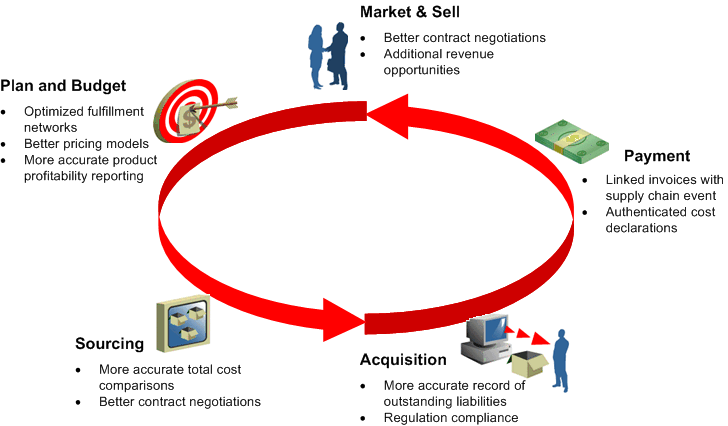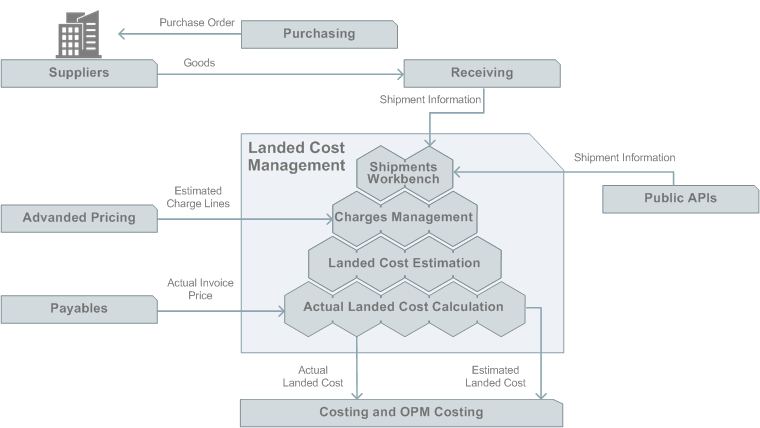Understanding Oracle Landed Cost Management
This chapter covers the following topics:
Oracle Landed Cost Management Overview
Oracle Landed Cost Management enables you to manage estimated and actual landed cost for:
-
Items purchased from a supplier
-
Items acquired using any document such as internal transfers, and drop shipments in Oracle E-Business Suite
-
Items acquired using any document external to Oracle E-Business Suite
Using Oracle Landed Cost Management you can determine the real costs associated with acquiring items. Those costs include insurance, transportation, handling, storage costs, container fees, and import or export charges. Visibility into these trade costs helps you better evaluate new product plans, price your items, and negotiate contracts with suppliers and customers.
Using Oracle Landed Cost Management you can estimate the landed costs for items and then you can update those costs with the actual landed costs as they become known. Oracle Landed Cost Management gives you the option to determine and calculate estimated landed costs before you receive the items into inventory (Landed Cost as a Pre-Receiving Application), after you receive the items into inventory (Landed Cost as a Service), or when you acquire the items using any document (Landed Cost for Any Document and Any Transaction). Then when you create and match invoices against those receipts this price information is used to calculate the actual landed costs for the item. You can view the estimated and actual landed costs for an item side by side. This comparison gives you valuable information about the landed cost for an item and where improvement can be made.
During the processing of landed costs, inventory valuations are maintained for various cost methods. These valuations provide visibility into the profitability of individual items and into the outstanding exposure of the organization. This visibility improves item forecasting and budgeting. For regulatory and reporting purposes, this data provides a detailed record of the accumulation of expenses.
For more detailed information about using Oracle Landed Cost Management, see:
Features of Oracle Landed Cost Management
Some of the key features of Oracle Landed Cost Management are:
-
Charge Management
Oracle Landed Cost Management collects an unlimited number of estimated charges and enables you to configure how theses charges are applied to a shipment line, a group of lines within a shipment, or an entire shipment. It applies these charges based on weight, volume, quantity, or the value of the items being traded. These charges can be categorized by different cost factors which ultimately govern the behavior in how they are included in a total landed cost calculation. After actual amounts are received, Charge Management records the new value for comparison with the earlier estimates.
-
Landed Cost Calculation
The Oracle Landed Cost Management Calculation process provides the ability to calculate the estimated landed cost based on charges manually assigned and automatically allocated based on the configuration of the charge lines. It also calculates the actual landed costs by prorating the actual invoices and proportional taxes to obtain the variances between what was estimated and what was charged. Cost components summed in the calculation remain stored at the most granular level for detailed tracking of charge amounts while variances are updated to the appropriate accounts.
-
Shipments Workbench
It is common that the financial flows do not mirror the physical supply chain transactional flows. Oracle Landed Cost Management helps to link these two flows together and provides visibility and traceability from one to the other. With the Oracle Landed Cost Management Shipments Workbench, companies can view the real time accrual updates for a particular receipt or shipment. They can validate the accuracy of a suppliers estimate by comparing estimated and actual costs and can view the percentage of a particular cost component for a particular item. Additionally, you can use all the flexible Oracle E-Business Suite tools to meet your own customized reporting requirements.
Benefits from Using Oracle Landed Cost Management
Operational Life Cycle

Using Oracle Landed Cost Management provides your organization with several benefits. Oracle Landed Cost Management helps organizations:
-
Maximize Profits
By illuminating “real” product costs, organizations have the opportunity to identify areas for potential cost reduction. It also helps managers more accurately monitor product performance against profitability targets and ensure estimated costs are in line with actual costs.
-
Increase Competitiveness
When all of the charges, fees, duties and taxes are known, companies can more strategically source products and components from lower cost foreign locations. This also enables them to better justify contracts with vendors or potential customers. Ultimately, they can price goods with the full understanding of the charges associated with bringing an item to market.
-
Increase Visibility
Itemizing and tracking all acquisition costs and material cost elements as they apply to a product enables organizations to better link their product supply flows with their financial processing and reporting. In addition, tracking estimated costs as soon as they are known gives decision makers more insight into their exposure for budgeting and reporting purposes before invoices are received.
-
Ensure Compliance
Companies can feel more confident in their financial reports and their cost declarations. This includes accurately calculated taxes and consideration of those taxes whose recovery must be excluded from total cost calculations. Additionally, organizations adhere to country specific requirements for product specific profitability documentation and income tax calculations.
Integration with Other Oracle Applications
Integration with Other Oracle Applications

Oracle Landed Cost Management integrates with several other Oracle E-Business Suite applications during the processing of estimated and actual landed costs for an item that is sourced from a purchase order and the receipt is created for the shipment in Oracle Purchasing (Receivables). The Oracle E-Business applications that integrate with Oracle Landed Cost Management are:
-
Oracle Purchasing
Purchase order information is the baseline information used to itemize expected shipment or receiving lines on which extended supply chain charges are applied. Oracle Landed Cost Management provides visibility into Oracle Purchasing purchase order data to build expected shipments for charge application and subsequent landed cost estimation calculations. When entering expected shipments the reference information provided by Oracle Purchasing saves time and decreases errors that might occur without automated access to this information. After the purchase order information is available in Oracle Landed Cost Management, expected values received from the purchase order such as quantity and price can be edited for estimated cost calculation purposes. All the necessary data is provided to help arrive at an accurate three way match after an invoice for a purchase order line or charge is entered into Oracle Payables.
Oracle Landed Cost Management recovers the tax lines associated with the purchase order that was originally calculated by EB-Tax, to include the non-recoverable amounts into the landed cost.
In addition, buyers can create simulations for landed costs while creating purchase orders in Oracle Purchasing. After the purchase orders are approved, the buyer has the option to create a new simulation version and update it in case of significant changes on the simulated landed cost component amounts. This enables the buyer to perform better sourcing decisions by comparing the overall landed costs including all applicable charges instead of relying on the item price only.
Oracle Purchasing (Receiving)
Oracle Landed Cost Management integrates tightly with the Oracle Purchasing Receiving module. Oracle Landed Cost Management relies on the Receiving transactions to calculate the estimated landed costs for a landed cost management shipment. These estimated landed costs are then forwarded to Oracle Cost Management to update inventory valuations and accounting.
Note: Oracle Landed Cost Management currently does not support receiving of purchase orders created in one operating unit but to be shipped to another operating unit (global procurement).
-
Oracle Payables
Invoices created in Oracle Payables provide the actual cost information that supports the actual landed cost calculations that occur in Landed Cost Management.
-
Oracle Cost Management and Oracle Process Manufacturing (OPM) Cost Management
After actual values are received from invoices the actual landed cost is calculated in Oracle Landed Cost Management. The variances between the actual landed cost and the estimated landed cost are determined. Those variances are passed to Oracle Cost Management which in turn updates the proper accounts and valuation. If you are using Oracle Process Manufacturing than you must first run a concurrent program that passes the variances to OPM Cost Management and that application in turn updates the proper accounts and valuation. Both process and discrete costing applications follow similar flows. Oracle Landed Cost Management calculates the estimated and actual landed costs and the variances, which are used for costing valuation and accounting.
-
Oracle Advanced Pricing (Optional)
Integration with Oracle Advanced Pricing enables you to set conditions for the automatic application of the required charges, fees, duties and taxes for a landed cost management shipment. This means that estimated charges can be applied automatically to a shipment.
Note: Oracle Advanced Pricing can also be used when managing landed cost for items that are acquired through documents that do not have purchase order receipts, such as internal transfers and drop shipments. Oracle Advanced Pricing can be used for the automatic application of the required charges, fees, duties and taxes for a landed cost management shipment that are associated to these types of documents or transactions.
-
Oracle Projects and Oracle Project Manufacturing (Optional)
Integration with Oracle Projects and Oracle Project Manufacturing provides the landed cost calculation, costing, and accounting for project-enabled organizations. This integration enables you to calculate estimated and actual landed costs for items associated with a project.